|
|
|
Sort Order |
|
|
|
Items / Page
|
|
|
|
|
|
|
| Srl | Item |
| 1 |
ID:
055117


|
|
|
| 2 |
ID:
064941


|
|
|
| 3 |
ID:
018823


|
|
|
|
|
| Publication |
Dec 2000.
|
| Description |
437-41
|
|
|
|
|
|
|
|
|
|
|
|
|
|
|
|
| 4 |
ID:
105640
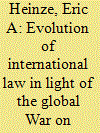

|
|
|
|
|
| Publication |
2011.
|
| Summary/Abstract |
This article explores how various aspects of the 'global War on Terror' may be affecting the future development of international law on the use of force. I examine these effects within three areas of international law - the law of anticipatory self-defence, the law of self-defence against non-state actors, and the applicability of international humanitarian law to non-state armed groups. Only in the latter two areas do I find evidence that international law is evolving to accommodate the new realities of global terror. While such developments in the law reflect the supposed need by states to use military means to combat terrorism, they also seem to confer at least a limited international legal personality upon terrorist groups such as Al-Qaeda. This not only indicates a shift in the basis for legal personality, but also potentially undermines the legitimacy of international law and frustrates states' efforts at combating terrorism.
|
|
|
|
|
|
|
|
|
|
|
|
|
|
|
|
| 5 |
ID:
091648


|
|
|
|
|
| Publication |
London, Routledge, 2008.
|
| Description |
xxv, 469p.
|
| Standard Number |
9781857434439
|
|
|
|
|
|
|
|
|
|
|
|
Copies: C:1/I:0,R:0,Q:0
Circulation
| Accession# | Call# | Current Location | Status | Policy | Location |
| 054508 | 355.4/WIL 054508 | Main | On Shelf | General | |
|
|
|
|
| 6 |
ID:
086574
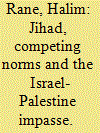

|
|
|
|
|
| Publication |
2009.
|
| Summary/Abstract |
A central factor in the failure to resolve the Israel-Palestine conflict is the direct competition that exists between its two most central international norms: 'self-determination', the fundamental claim of the Palestinians, and 'self-defence', the overriding concern of Israelis. Particularly since 9/11, Palestinian violence has been a liability for their cause and has served to validate Israel's self-defence arguments. Increasingly, Palestinian violence has been perpetrated by the Islamically oriented under the banner of jihad, which is understood almost exclusively in terms of armed struggle. Non-violence - which has the potential to undermine Israel's self-defence arguments and generate external pressure on Israel to adhere to the terms of a just peace - has been under-appreciated by such Palestinians. Non-violence is far from having a normative status in the Muslim world as an Islamically legitimate response to occupation and it is yet to be conceptualised as an effective form of resistance. The concept needs to be reformulated in accordance with the realities and opportunities confronting the Palestinians. Contextualisation combined with a maqasid or objective-oriented approach establishes non-violence as a preferable option to violence both in terms of the higher objectives of jihad, enshrined in the Quran, as well as of the attainment of Palestinian self-determination.
|
|
|
|
|
|
|
|
|
|
|
|
|
|
|
|
| 7 |
ID:
056718


|
|
|
| 8 |
ID:
071098


|
|
|
| 9 |
ID:
151568
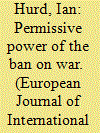

|
|
|
|
|
| Summary/Abstract |
The ban on inter-state war in the UN Charter is widely identified as central to the modern international order–Michael Byers calls it ‘one of the twentieth century’s greatest achievements’. Even if it is only imperfectly observed, it is often seen as a constraint on state autonomy and an improvement on the pre-legal, unregulated world before 1945. In response to this conventional view, this article shows that the laws on war in the Charter are better seen as permissive rather than constraining. I make two points. First, by creating a legal category around ‘self-defence’, the laws on war authorise, and thus legitimate, wars that are motivated by the security needs of the state, while forbidding other motives for wars. Second, state practice since 1945 has expanded the scope of this authorisation, extending it in both time and space beyond the black-letter text of the Charter. The permissive effect of law on war has therefore been getting larger. These two effects suggest that international law is a resource that increases state power, at least for powerful states, and this relation between international law and power politics is missed by both realists and liberal internationalists.
|
|
|
|
|
|
|
|
|
|
|
|
|
|
|
|
| 10 |
ID:
061774
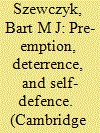

|
|
|
|
|
| Publication |
Apr 2005.
|
| Summary/Abstract |
The policy of the United States, outlined in the 2002 National Security Strategy, whereby the US claims a right under international law to engage in pre-emptive use of force to prevent a rogue state's development of nuclear weapons, or any weapons of mass destruction (WMD), is unnecessary and therefore unlawful under customary international law of self-defence. This conclusion is reached through a comprehensive and intensive assessment of the normative reactions of politically effective actors to China's development of nuclear weapons during a two-year period between the Cuban Missile Crisis and China's first test in October 1964. While pre-emptive use of force against China, a rogue state, was considered by both the United States and most likely by the Soviet Union, neither used force to prevent it developing nuclear weapons. Since a policy of pre-emptive use of force was unnecessary for either state's self-defence, it would have been unlawful under customary international law. Given that the current strategic scenario of states vis-à-vis rogue states is the same under most circumstances, notwithstanding the existence of international terrorist networks, the article concludes that the proposed claim of the United States is, prima facie, unnecessary to its self-defence, and therefore unlawful under customary international law of self-defence. It shifts the burden of proof to policymakers claiming that all rogue states can be lawfully prevented through pre-emptive use of force from acquiring nuclear weapons, to establish that a particular state cannot be deterred from the use of nuclear weapons. Though the preventive war claim of the US National Security Strategy 2002 may turn out to be an effective strategic bluff in limiting WMD proliferation, the wisdom of the threat should not be confused with the illogic of preventive war.
1 The author wishes to thank Professor Michael Reisman for his advice and guidance on the legal methodology used in the article and Professor John Lewis Gaddis for his emphasis on the strategic considerations underlying the Cold War policies of the United States, the Soviet Union, and Communist China in relation to each other. Any errors or omissions are solely the fault of the author.
|
|
|
|
|
|
|
|
|
|
|
|
|
|
|
|
| 11 |
ID:
059226


|
|
|
| 12 |
ID:
056648
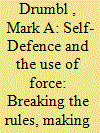

|
|
|
| 13 |
ID:
149481


|
|
|
|
|
| Summary/Abstract |
This article challenges the well-established presentation within conflict studies of paramilitary organizations as state-manipulated death squads or self-defence groups, and argues that some present-day militias extend their functions well beyond the role of shadowy pro-regime enforcers. Drawing its empirical insights from Ukrainian pro-government volunteer battalions and supporting its findings with empirical observations from other parts of the world, the article posits that the rise of powerful militia organizations acting in parallel with the state makes it imperative to revisit the theory and typology of paramilitary violence. The key theoretical argument of the article is that ‘state-parallel’ militias differ qualitatively from the ‘state-manipulated’ paramilitaries that are typical of the Cold War period. The article shows that although ‘state-parallel’ paramilitaries are not a new phenomenon, they have thus far remained critically understudied and undertheorized.
|
|
|
|
|
|
|
|
|
|
|
|
|
|
|
|
| 14 |
ID:
130952


|
|
|
|
|
| Publication |
2014.
|
| Summary/Abstract |
It is clear the United States and other major powers see drone warfare as the wave of the future. Today more than 70 countries possess drone technology and many others are seeking to acquire it. It is expected that within 20 years, there will be swarms of drones and many autonomous fighters and bombers in use around the globe. If the trends continue as anticipated, these drones will usher in a 'boundless and borderless war without end'. The development of technological improvements will eventually lead to a militarisation of foreign policy and unnecessary conflicts. While the circumstances in Pakistan are unique, the questions surrounding the US drone programme in non-combat zones such as Pakistan raise important issues regarding how drone use should be governed in the future. This article is an attempt to analyse legal and ethical issues raised by the US use of drone technology in non-combat zones such as Pakistan, and it looks into its underpinnings and also its repercussions as tool in prospective warfare.
|
|
|
|
|
|
|
|
|
|
|
|
|
|
|
|
|
|
|
|
|